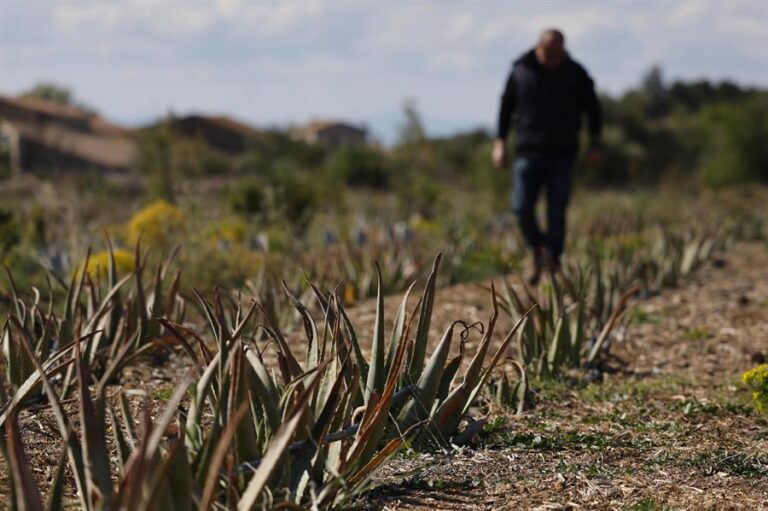
Drought leads to Aloe Vera!
Paris, Apr 27 (EFE).-
Although the autumn and winter rainfall has brought relief to some regions, an intense drought is gripping southern France – as well as Catalonia, on the other side of the Pyrenees – and, after two years without rain, farmers have started swapping vines for aloe vera, rosemary and other aromatic plants.
“We have the same problem as in Barcelona, it goes up along the Mediterranean coast and for us, in France, the gates of the desert open,” says Laurent Maynadier, who runs the vineyards and winery Château Champ des Sœurs in Fitou, near Perpignan, and whose family have been winegrowers for 13 generations.

In the last five years, the vineyard has shrunk from 18 hectares of vines and producing between 70,000 and 80,000 bottles a year, to only 10 hectares and looking at each year’s production with increasing uncertainty. In 2023, the drought completely destroyed production.
In 2019, “you could feel trouble” looming, Maynadier tells EFE, when they saw thermometers reading up to 45 degrees in the shade in summer.
“The vines were burned,” he says, a blow to the entire region despite the fact that winemakers like Maynadier have been harvesting in July for eight years and have been making their wines lighter due to the new conditions.
Thanks to the wine that has been stored for aging, the producers still have a financial cushion, but if future vintages fail, the medium-term survival of the wineries in the Pyrénées-Orientales and Aude departments is in jeopardy.
The problem is not unique to this part of France, which is the world’s leading wine producer. Climate change threatens wineries worldwide, as the International Organisation of Vine and Wine (OIV), which in 2023 counted a 10% drop in global production due to extreme weather conditions, pointed out on Thursday.

TURNING TO ALOE, ROSEMARY
Nevertheless, Maynadier refuses to let “defeatism” win. Farmers like him are beginning to experiment with new crops, especially aloe vera, but also aromatic plants such as rosemary, lavender and sage.
The need to reinvent oneself is imperative, Maynadier believes, since drought is the new normal. They also receive “many promises” but little real support form local authorities to ease the situation.
“I am not alone, we have created a group for the Eastern Pyrenees and other people from Aude, around the Mediterranean, to grow aloe vera. The brand will be called Aloed’Oc and we would like to have some recognition from the State (…) If we don’t find something else, we will disappear,” he warns.
Not all of Maynadier’s neighbors, however, have grasped the idea that climate change is going to change their way of life forever, even though in some municipalities in the area the supply of drinking water has already had to be done through tanker trucks.
“Honestly, I hope they are right when they say that it is a one-time thing and that it will pass,” he says, although he knows that sporadic episodes of storms such as those predicted for the coming weeks will not be enough to solve two years of rainfall deficit that some months was 80% compared more than the usual levels.

Groundwater, on the other hand, is at very low levels in the entire Mediterranean coastal area extending from the border with Spain, according to data from the French National Geological Service.
The contrast is abysmal compared to what is happening in the rest of France, where the rains of recent months have recharged the water tables in a “satisfactory” way, reaching high or very high volumes in the vast majority of the Atlantic coast.
The rains that have irrigated the rest of the country hardly reach the coasts of the Pyrénées-Orientales and Aude because of the relief of the terrain, which protects them from the fronts coming from the Atlantic, leaving them largely reliant on scarce rains coming from the east. EFE
ngp/ks




